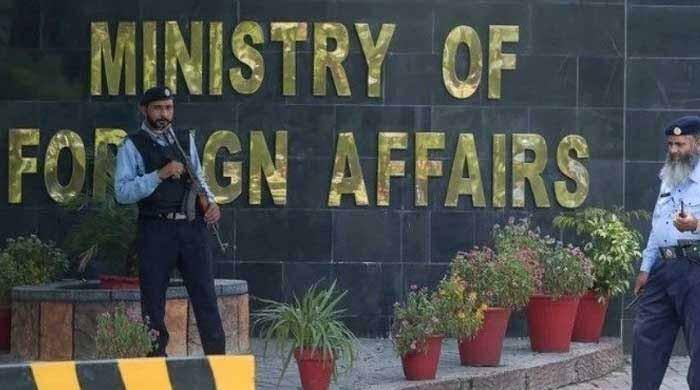- Pakistan thanks Turkiye, Qatar for mediating talks.
- Afghan regime failed to act against terrorists: FO spox.
- Islamabad wants militants to be handed over at border.
ISLAMABAD: Pakistan on Sunday castigated the Afghan Taliban regime for using the Istanbul talks to malign Pakistan rather than address Islamabad’s core concern of terrorism emanating from Afghan soil.
“Instead of finding solutions to address Pakistan’s core concern, the Afghan regime used the opportunity to malign Pakistan through hypothetical accusations and jingoistic rhetoric,” Foreign Office spokesperson Tahir Hussain Andrabi said in a statement.
The peace talks between the Afghan regime and Pakistan broke down, although a ceasefire continues between the South Asian neighbours.
On November 7, Defence Minister Khawaja Asif told Geo News that the negotiations have been suspended, with “no programme for the fourth round of talks”. “There is a complete deadlock. The negotiations have entered an indefinite phase.”
In his statement, the FO spokesperson noted that anyone following the talks held under the mediation of Turkiye and Qatar could easily “discern that the Taliban regime was only interested in prolonging the temporary ceasefire, but without taking concrete and verifiable actions against the terrorist elements present on Afghan soil.”
“It prolonged discussions and engaged in futile arguments to stonewall the efforts at reaching any concrete understanding,” the spokesperson added.
The statement recalled a sharp surge in terrorist attacks from Afghanistan since the Taliban took power in August 2021, adding that Pakistan, despite military and civilian casualties, had exercised maximum restraint and avoided retaliation.
“Pakistan’s expectation was that the Taliban regime would control TTP/FaK and BLA/FaH elements and take concrete actions against them.”
The FO said it had sought to encourage stability in Afghanistan through trade concessions, humanitarian assistance, and facilitation of educational and medical visas, and by urging the international community to engage the Taliban regime for regional peace and socio-economic development.
However, the spokesperson said, the Taliban response had been largely limited to “hollow promises and inaction”.
“Instead of acting upon the core expectation from Pakistan i.e. not to allow Afghan territory to be used for attacks against Pakistan, the Taliban regime has always tried to shy away from taking concrete and verifiable actions.
“Instead, it has tried to confuse the main issue with other relatively irrelevant and hypothetical issues. By confusing the main issue of terrorism, it keeps trying to develop a narrative which absolves the Taliban regime of its commitments and responsibilities towards the international community and its own people,” he added.
Describing Pakistan’s October 2025 response to persistent attacks from Afghanistan as a demonstration of national resolve, the Foreign Office reiterated that “TTP/FaK and BLA/FaH are declared enemies of the State of Pakistan and its people.”
The spokesperson warned that anyone harbouring, abetting or financing these groups would not be regarded as a friend of Pakistan.
‘Three rounds of talks’
Referring to the three rounds of talks, the spokesperson noted that Pakistan was also a strong proponent of peace and diplomacy. “It has always advocated that use of force is the option of very last resort.”
“In the same spirit of giving peace and diplomacy every possible chance, and adhering to the sincere advice of Turkiye and Qatar, Pakistan agreed to engage in Pak-Afghan peace talks mediated by sincere friends,” the statement noted.
At the first round of these talks in Doha, the spokesperson said, an understanding was reached with Afghanistan on certain principles of cooperation and responsibility. Accordingly, Pakistan agreed to the temporary ceasefire.
The statement noted that the second round of talks in Istanbul was intended to devise an implementation mechanism for commitments reached at the first round in Doha, but said Taliban representatives avoided taking measures on the ground and sought to vitiate the environment with provocative media allegations.
“Pakistan maintained its firm demand for concrete and verifiable action against terrorist elements and for the establishment of an effective monitoring mechanism,” it added.
At the third round, Pakistan again engaged with a constructive approach to focus on the establishment of an effective monitoring mechanism.
However, the Afghan side tried to dilute the focus on the core issue of terrorism and expand the scope of engagement by bringing in hypothetical allegations and unfounded claims, it added.
‘Pakistani terrorists in Afghanistan’
The statement also rejected attempts by Taliban representatives to frame Pakistani terrorists in Afghanistan as a humanitarian or refugee issue, saying this constituted a ploy to absolve terrorists of responsibility.
Pakistan said it was willing to receive any Pakistani nationals living in Afghanistan, provided they were handed over at designated border crossings — Torkham or Chaman — and not pushed across the frontier armed and equipped.
While reaffirming Pakistan’s commitment to dialogue, the Foreign Office stressed that terrorism emanating from Afghanistan must be tackled first and foremost.
“Pakistan has never eschewed dialogue with any Government in Kabul. However, Pakistan would not hold dialogue with any terrorist group, be it TTP/FaK or BLA/FaH,” it added.
‘Strong lobby in Afghan Taliban’
In the statement, the spokesperson said that some within the Taliban regime opposed confrontation with Pakistan, but that a powerful lobby reportedly backed by foreign actors was stoking tensions to seek legitimacy and unite the Kabul administration.
“In search for legitimacy and to unite their fractious government, certain elements in the Taliban regime, anti-Pakistan terrorist elements and their abettors have found raising the bogey of Pakistan quite useful,” it added.
These elements have engaged in abuses and outrageous allegations against Pakistan, it said, adding: “By doing so, they are fast eroding whatever goodwill they had within Pakistan.”
The statement further read that some elements in the Taliban regime also try to propagate that there is some disagreement within Pakistan over Afghan policy
“Irrespective of this misleading propaganda, there is absolute clarity among the people of Pakistan that the ordinary people of Pakistan are the biggest victims of the terrorist activities by elements hiding in Afghanistan and their abettors,” it added.
‘Pashtoon nationalism’
Addressing attempts to instigate Pashtoon nationalism in Pakistan, the Foreign Office reminded that Pashtoons are a vibrant and integral part of Pakistani society, and urged the Taliban to focus on inclusive governance in Afghanistan rather than fomenting discord across the border.
“While Afghan Taliban declare terrorism as Pakistan’s internal issue, they fail to mention that there are people in Afghanistan who have issued fatwas, legitimising terrorist attacks against Pakistan,” it said, adding: “Moreover, terrorist groups operating inside Pakistan now comprise a large number of Afghan nationals.”
Pakistan remains committed to the resolution of bilateral differences through dialogue, the spokesperson said. “However, Pakistan’s core concern, i.e. terrorism emanating from Afghanistan, needs to be addressed first and foremost,” it concluded.


